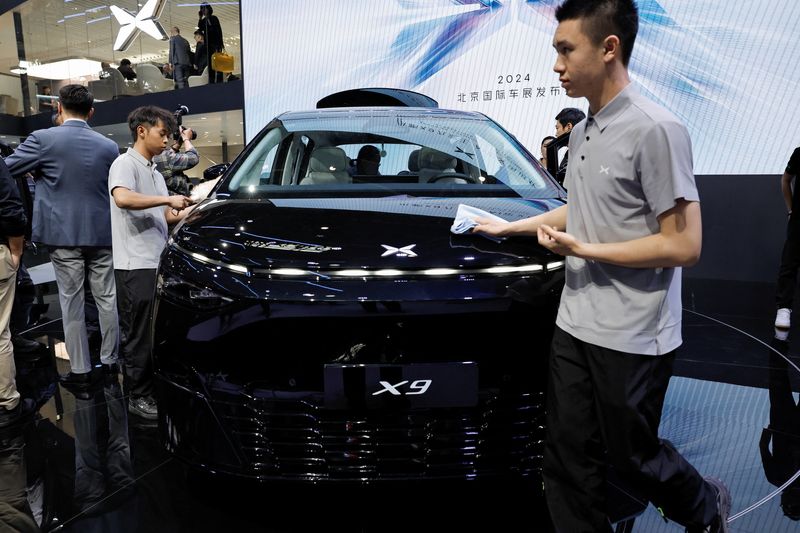BEIJING (Reuters) - China's largest auto show opened in Beijing with the biggest names showing off their latest electric vehicles (EVs), underlining how the world's largest auto market is already in an all-electric state of mind, and isn't looking back.
Here are the main takeaways:
OVERCAPACITY & GEOPOLITICS
The last thing China needs is more electric cars crowding a market, driving down prices at the expense of profit. But while there is a peril in China's overcapacity, there is also a power in the hyper-competition it has unleashed.
Exporting that overcapacity, however, has brought EV makers to authorities' attention. XPeng (NYSE:XPEV) said a European probe into Chinese-made EVs could steer it to invest in plants or suppliers abroad, as the spectre of higher tariffs looms.
Polestar (NASDAQ:PSNY) Automotive is preparing to shift production of cars it plans to sell into Europe to its U.S. plant from China, its CEO said.
PARTNERSHIPS
Tie-ups with local firms had long been foreign automakers' route into China but are now becoming a means to survive.
Mercedes-Benz (OTC:MBGAF) said it would continue to invest in tie-ups with Chinese automotive partners including BAIC.
Toyota (NYSE:TM) will pair up with tech giant Tencent while Nissan (OTC:NSANY) will team up with Baidu (NASDAQ:BIDU), the companies said, cross-border partnerships that highlight the importance of artificial intelligence for carmakers.
LUXURY
The battle for consumer attention in China's electric car market is being fought over touches of "tech luxury" that car buyers in other markets have never seen.
BYD (SZ:002594) will showcase its premium brand's first sedan and unveiled the U7, its third ultra-luxury model under the Yangwang brand, as it pushes upmarket to increase profitability amid an intensifying price war.
NEW LAUNCHES
Nissan and Mazda unveiled new cars tailored for Chinese drivers, signalling a fresh push by Japanese automakers to regain ground in the world's largest auto market.
Nio (NYSE:NIO) set the starting price of the new version of its ET7 sedan at 428,000 yuan ($59,063). Smartphone maker Xiaomi (OTC:XIACF) said it has locked in 75,723 orders for its sporty SU7 electric sedan, and aims to deliver over 10,000 units in June.
TECHNOLOGY
Domestically designed advanced driving assistance systems similar to Tesla (NASDAQ:TSLA)'s Full Self-Driving (FSD) were also marketed by several automakers as key selling points.
BYD said it will launch the Song L SUV with the company's self-developed smart driving system in June.
GAC said it would use Huawei's Qiankun smart driving system on flagship models under the Trumpchi sub-brand, with the first to be launched in January 2025.
Battery maker CATL unveiled a lithium iron phosphate (LFP) battery with a driving range of more than 1,000 kilometres (621 miles) on a single charge.
SMARTPHONES TO SMARTCARS

Stealing the limelight from traditional automakers and EV startups was industry newcomer Xiaomi who held one of the earliest press events.
CEO Lei Jun said locked-in orders for its sporty SU7 sedan had hit 75,723 and that buyers included owners of cars from the likes of BMW (ETR:BMWG) and Audi.
($1 = 7.2464 Chinese yuan renminbi)